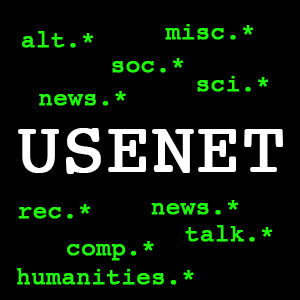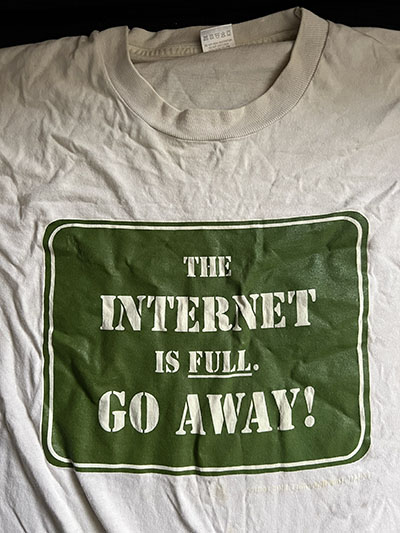 Would you like some more USENET lore? OK, let’s talk about
Would you like some more USENET lore? OK, let’s talk about
- Menudo (note the capital letter)
- green card lawyers
- kooks and spambots
- war with Scientology
- Joel Furr T-shirts
- eternal September
- how Google ruined the party
…and the Internet’s first deity. And that’s just the first 30 years.
Last time we talked about a newsgroup. What if you want a new newsgroup? There is a complex and probably now irrelevant process for voting. I’m told this has changed – I haven’t researched, but back in the day, tou’d campaign in different groups for your group, discuss, etc. and then there would be a vote – yes, a vote on the Internet where anyone with an email could say yea or nay. Talk about a simpler era.
Yours truly can proudly say he voted against rec.music.menudo (what, you’ve never heard of the music group Menudo? Neither has anyone else). Indeed, I recall some people observing that because a nomination had to pass by a certain percentage, a no vote was much more powerful than a yes vote. So there was a movement of people who felt too many groups were getting nominated and resolved to vote no en bloc against all new groups, thus making it difficult for new groups to pass.
Talk about fighting over small stakes. As a couple quotes summarize:
- “Academic politics is the most vicious and bitter form of politics, because the stakes are so low.” – Wallace Sayre
- “USENET: welcome to the next level.” – anonymous, USENET
Eventually the alt hierarchy was founded where anyone could create a group, with the predictable chaos, cancel wars, etc.
Now let’s talk about spam. The term spam may have originated on USENET.
Two “green card lawyers” had the idea to post an ad in every single newsgroup, which was unprecedented and extremely rude. This was followed by numerous others – the subject “Make Money Fast” itself became a meme. A dedicated team of engineers came up with a way to target “cancel” messages that would filter this spam. This problem is ancient.
There are a raft of USENET kooks that have been documented. These people posted endlessly and intensely. Now, I’m passionate about some topics and have been known to wade into an online debate or two, but these people are not only genuinely loony tunes but also seemed to have endless energy.
Why do I say looney tunes? The whole gamut: UFOs, time cube stuff, conspiracy theories, genocide denial, etc. My favorite was UFOlogist Robert E. McElwaine who wrote long screeds and signed every one “UN-altered REPRODUCTION and DISSEMINATION of this IMPORTANT Information is ENCOURAGED, ESPECIALLY to COMPUTER BULLETIN BOARDS.”
Serdar Argic was another famous one and may be credited with the first spambot. Argic was a nut who had some revisionist theories about the Armenian genocide. He wrote a bot that scanned all of usenet for the mention of Turkey or Armenia. Any post containing the string “turkey” or “armenia” would be auto-replied to with one of many randomly-chosen screeds. This was somewhat hilarious when someone’s discussion about their Thanksgiving recipes was interrupted by a foam-mouthed screecher ranting about genocide.
This lead to a particular genius, James “Kibo” Perry, realizing that one could, in essence, summon Serdar’s bot into any thread simply by including the word “turkey”. Perry turned this noxious behavior on its head by instead creating his own bot that notified him when anyone used the word “kibo”. He would then personally visit the thread and comment with a humorous one-liner. In effect, he became the Internet’s first deity, who could be summoned and would omnisciently reply. A “religion” was formed around him and celebrated on – where else? – alt.religion.kibology.
Perry kept this going for a very long time. Quoting Wikipedia:
“In 2006, Parry estimated that he had posted ‘an average of 20 articles a week to alt.religion.kibology during the past 15 years, probably about 500 words of original content per article, that’s… seven point eight mmmmillion [sic] words. Equivalent to about 100 books.'”
The Original Scientology vs. the Internet Battlefield
Scientology’s first war against the Internet was fought in alt.religion.scientology, an early critical group that came under sustained assault by the church. In 1994, the “OT Levels” (with the infamous “Xenu” material) was leaked on a.r.s and the Church went crazy. The Church started first with legal threats and then with technical assaults, which naturally only caused the group to surge in popularity.
The famous Penet anonymous remailer (anon.penet.fi, a domain I still remember nearly 30 years later) was shut down due to the a.r.s wars, and there are individuals still paying settlements to the Church of Scientology years later. For example, Grady Ward was sued, alleging he had anonymous posted Church secrets to a.r.s. He was bombarded with over 1,000 legal filings and eventually settled with the Church. He will pay $200 a month for the rest of his life. Crazy times!
Private Groups?
Were there any private USENET groups? No – this was impossible. Well, almost.
One could post encrypted messages, and given how leaky things were, do so in a reasonably anonymous way. PGP emerged in this era and that made everything feasible. But really, private discussion groups of the era were done via private email – either mailservers or just a group of people CCing each other.
I don’t mean the way you’d CC your coworkers or people you know. There was a lively culture in email groups which one could apply to and perhaps join. If you were accepted, you got a list of everyone’s email, and were expected to “blind carbon copy” all of them. “Blind to <group name>” was a common expression.
Google. Delphi, and Universities Ruined It All
Next time, we’ll talk about what USENET is like today, but today is really the second era of USENET. What I’ve described above is the first era, which I’d place at 1980 to the early 2000s.
The first era itself had a couple sub-phases. The first was a small, somewhat intimate community because there weren’t that many involved. It was mostly universities, research institutions, and large companies. These users were generally sophisticated because they were mostly computer professionals or related “super users” (e.g., a scientist who used computers a lot).

I bought this shirt circa 1994, which expressed the general sentiment of netizens regarding the influx of new users. These were sold by Joel Furr.
Every September, a flood of new users joined – university students who’d just arrived at school and been provisioned accounts. They generally barged in, breached netiquette, were swiftly corrected, and then integrated into the community. People groaned about “September coming” but it was not a major event.
However, once ISPs like AOL and Delphi and others opened up USENET to their users (circa 1993-94), there were a flood of users and they began coming in droves, regardless of the time of year. This was referred to as Eternal September and some feel it “blew up” the original USENET culture.
End of an Era
But there were other reasons.
First, for people who were truly interested in focused conversations, the web was far easier to use. The web also offered permanence – well, as much as anything on the web is, but compared to ephemeral postings. It also moved the cost from everyone to those who wanted to provide the content. Finally, you could do so much more with it: images, fonts, layouts, hyperlinks, and soon multimedia, etc. And today we have social media. USENET was the social media of its day, but it’s two full orders of magnitude back in technology.
Second, pipes got bigger. People started wanting to share binary files. When 9600 baud modems dominated the landscape, downloading 4MB of content took an hour. The text-only format of USENET was a blessing when bandwidth was precious but a limitation once it became abundant.
Third, binaries took over. We’ll talk more about that next time, but essentially as the “casual readers” moved to different platforms, USENET became dominated by people exchanging media. Eventually different ISPs began to wonder if they were really providing something people wanted and began to shut down USENET, lather rinse repeat down the drain.
Finally, Google screwed everyone. In 1995 a very cool company called DejaNews began archiving all USENET posts. I think they filtered binaries as I recall but otherwise it was a complete feed. They published this archive as a web site and you could also use it as a newsreader, posting articles, subscribing to groups, etc. There was a premium feature as I recall as well. It was awesome.
And it enabled nearly anyone who didn’t want the hassle of running a USENET server to say “we’re closing ours, but look, you can go to DejaNews and it’s awesome”.
Speaking of awesome, the name “DejaNews” is one of my favorite company names ever. Perfectly fits what it offered in a very elegant pun.
And then, Google bought it in 2001. Shortly thereafter, features began shutting down, and it was subsumed into Google Groups. Google acted as if USENET was dead technology and everyone would obviously want to use Google Groups instead. However, no one really wanted to use Google Groups. Using the USENET interface was made a hassle and since a lot of ISPs were no longer providing USENET, this was a pretty bit body blow to the technology.
Next Time
Still to come: USENET in 2022, a step-by-step using the technology, a review of Frugal Usenet, and an interview with the company!





















Leave a Reply